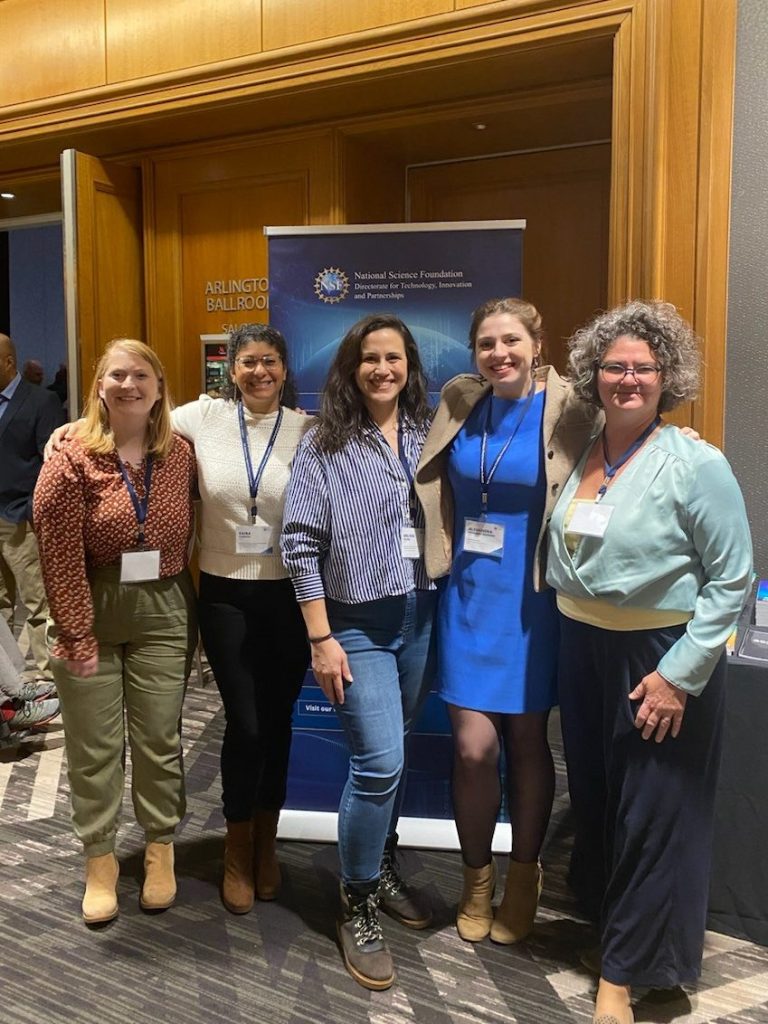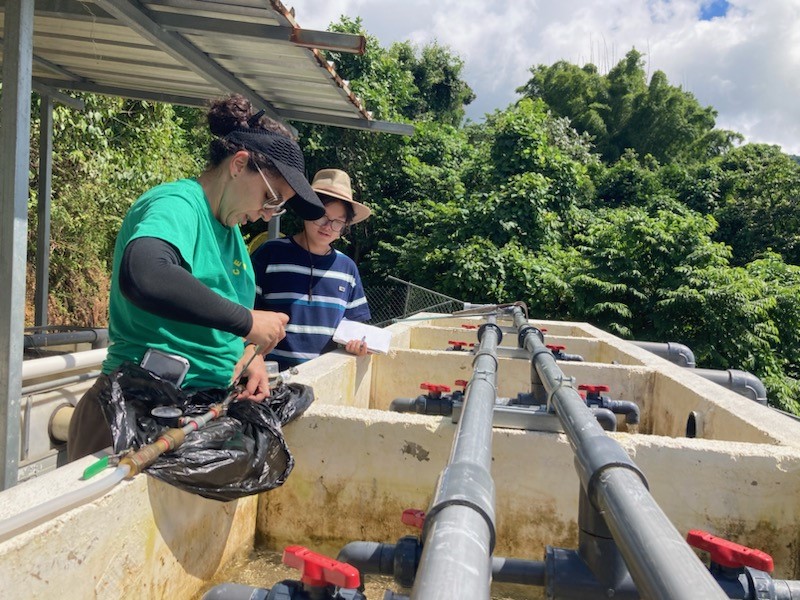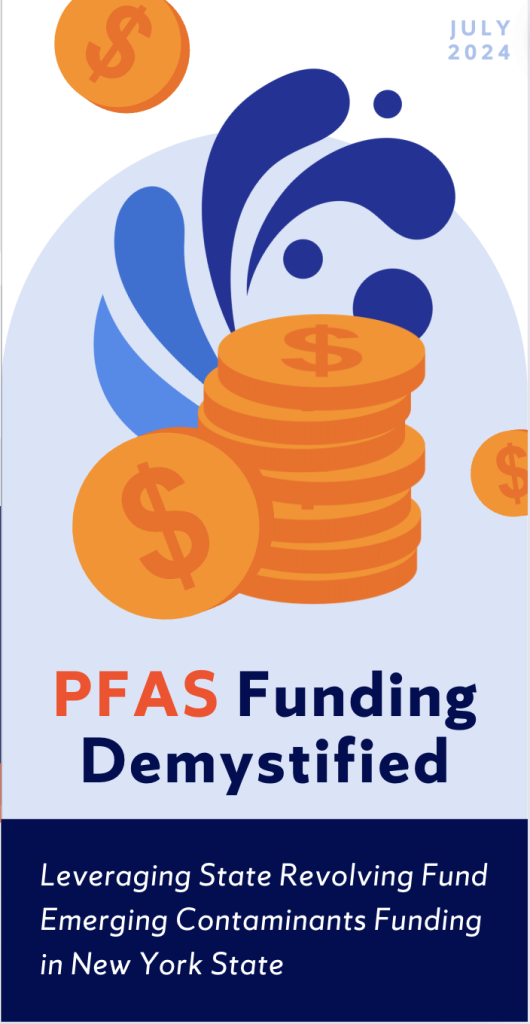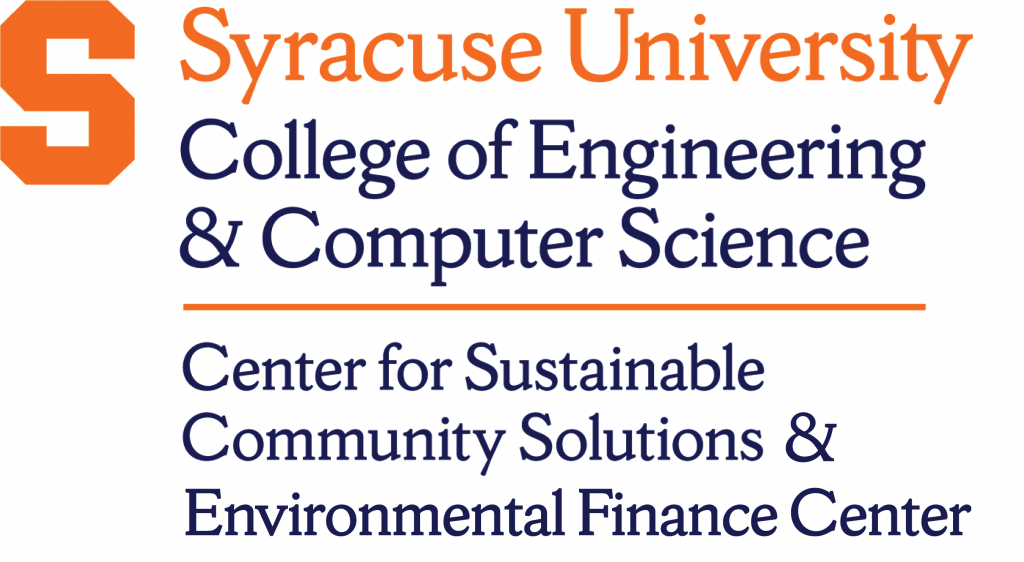We are looking for collaborators to work with us on a diverse range of community-driven assistance projects through our new consultant pool initiative. Please consider responding to our Request for Proposals if you are a firm, non-profit organization, or individual interested in supporting resilient and equitable environmental infrastructure. We look forward to working together to create sustainable and impactful solutions for our communities.
News
NYS SMM Stewards Engage Communities through Social Media, Interactive Presentations, in 2024 Project Roundup
The Spring 2024 cohort of the New York State Sustainable Materials Management (NYS SMM) Stewardship Program has concluded with another successful round of creative engagement projects aimed at fostering curiosity and greater understanding of SMM in local communities and beyond.
The NYS SMM Stewardship Program is a long running, student-centered program developed by the Syracuse University Center for Sustainable Community Solutions (CSCS) and administered in partnership with the New York State Association for Reduction, Reuse and Recycling (NYSAR3) and the Center for Sustainable Materials Management (CSMM) at SUNY ESF. This annual opportunity provides college/university students from across the state with a unique chance to explore and deepen their knowledge of the concepts of “sustainable materials management” — a term that reflects a holistic approach to the use and reuse of society’s materials throughout their entire life cycles, with a focus on environmental impact and conservation of resources.
Topics studied through the program include traditional recycling, composting, single-use plastics, reuse/repair, textiles, and effective community engagement, as well as current issues and challenges in the industry including resource extraction, overconsumption, “waste” as a concept, and environmental pollution.
This virtual paid learning experience currently occurs in the Spring semester each year. Students receive training, mentoring, and guidance to engage local communities through hands-on, experiential SMM projects that work to address waste challenges they are currently facing.
This unique remote opportunity has helped future SMM leaders launch their careers. Many stewards have transitioned directly into SMM-related jobs after graduation from their respective colleges, leveraging the valuable skills and professional experience gained through the program.
The Projects
In Spring 2024, 19 stewards from 12 NYS colleges/universities (including SUNY New Paltz, SUNY-ESF, Binghamton University, and St. Lawrence University) completed the program, resulting in a variety of community engagement projects, such as compost bin building, podcast interviews with SMM industry leaders, and in-class interactive presentations at local K-12 schools.
Please see below for samples and a list of our stewards’ Spring 2024 projects!
Interested in becoming a steward?
Do you know someone who is interested in applying to the NYS SMM Stewardship Program? Applications for Spring 2025 will open in September 2024 and can be found on the NYS SMM Stewardship webpage.
Interested in supporting a steward?
If you have a project that a steward could help with, or are interested in working with a future SMM steward, please contact CSCS Program Associate Morgan Ingraham at meingrah@syr.edu for more information.
Isabela Fraguada, Stony Brook University
Topic: Animation & Social Media Outreach
Isabela Fraguada created an animated character named Turkeybacon, a veteran of the Marine wars against plastic pollution and advocate for SMM. Through a series of Instagram outreach posts, Turkeybacon explains and demonstrates concepts of SMM such as reuse, repair, and composting. Follow the QR code to see Turkeybacon in action, or follow him on @turkeybaconturtle on Instagram!
Richard Correa-Lampasona, St. John’s University
Topic: Extended Producer Responsibility Podcast – Interview with Product Stewardship Institute
Richard Correa-Lampasona hosted a podcast interview with Scott Cassel, CEO and Founder of the Product Stewardship Institute. This educational podcast gives a background on Extended Producer Responsibility (EPR) policy, as well as an insight into what PSI is all about. Follow the QR code or go to tinyurl.com/SMMStewardEPR to listen to the podcast!
Wren Kingsley, SUNY New Paltz
Topic: SMM Education & Advocacy Campaign at Local Middle School
Wren Kingsley worked with New Paltz Middle School’s Climate Club in a series of SMM-related workshops. The first workshop, Recycling 101, consisted of an in-class game where New Paltz Middle School students sorted items to learn about what was recyclable or not. Then, students were taken on a tour of the New Paltz Recycling and Reuse Center. Back in the classroom again, students built a worm bin to learn about composting. Finally, students engaged in a letter-writing campaign to local government officials to express their concerns about climate change.
Other Projects
Litter Cleanup Composition and Outreach: Lauren Hamilton Musso, SUNY-ESF
Waste in Small Business: Willow Mercer, Stony Brook University
Repair Day Pop-Up Event: Shawna Stevenson, Binghamton University
Waste in Local School: Brady Hartnett, Syracuse University
How University Students View Single-Use Plastic Waste on Campus: Elizabeth Vool, Stony Brook University
Upcycling Materials for Less Waste: Kimberly Bravo, St. Lawrence University
Middle School Recycling Education: Maggie Saville, SUNY Binghamton
Compost for Community: Brianna Rodriguez, SUNY New Paltz
College Campus Clothing Swap: Kade DeMarle, SUNY Albany
Waste Tracking in Elementary Schools: Janice Yohannan, Stony Brook University
Increasing the Engagement of the Campus Thrift Store: Valeria Obregon, St. Lawrence University
Pop-Up Thrift Shop & Clothing Swap: Jessie Mazzeo, SUNY Geneseo
Campus Litter Analysis: Dolphins Collect: Meghan Walton, Le Moyne College
Climate Smart Communities Waste Reduction Education Campaign: Caitlyn Davey, Binghamton University
Feasible SMM Campaign: A Digestible Approach to Zero-Waste: Jordan Winkelman, Syracuse University
Thank you to our partners
The NYS SMM Stewardship Program is administered in partnership with NYSAR3 and with grant funding from the United States Department of Agriculture (USDA), U.S. Environmental Protection Agency (EPA), and CSMM.
PFAS Funding Resources
This resource page is dedicated to helping you navigate and leverage funding opportunities for addressing PFAS and other emerging contaminants in New York State. Our brochure, “PFAS Funding Demystified,” provides vital information on the available financial resources to support your community’s efforts in managing and mitigating these hazardous substances.
PFAS Funding Demystified Brochure
The following resources are organized in the same order as presented in the brochure:
Animation | The PFAS Problem: How Does PFAS Get Into Our Water and How Can It Be Harmful?
Clean Water
Application | Apply for CWSRF Funding
Criteria | CWSRF Hardship Policy and Criteria
Drinking Water
Application | Apply for DWSRF Funding
Case Study | Drinking Water Project in Hicksville, NY
Criteria | DWSRF Hardship Policy and Criteria
NYS EFC: Step-By-Step Support for Accessing State and Federal Funding
Act now! Don’t wait to secure your funding and address PFAS in your system.
Syracuse University Joins Team in $650K National Science Foundation Award to Accelerate Drinking Water Solutions for Small Communities

With funds sub-awarded through the U.S. National Science Foundation’s (NSF) Convergence Accelerator program, Syracuse University’s Center for Sustainable Community Solutions (CSCS) will help develop more accessible pathways for small communities to develop and maintain safe drinking water infrastructure. This collaborative project will focus on communities in Puerto Rico, with the ultimate goal being to use this case study as a framework that can be replicated in other U.S. locations and beyond. The project officially kicked off in February 2024.
Access to clean drinking water is a right for all that is threatened by the looming climate crisis. In 2022, 2.2 billion people lacked safely managed drinking water; and 2 billion people lacked a basic hand washing facility, according to the National Institutes of Health.
Many of those without access are communities of less than 10,000 people who face their own unique obstacles. In Puerto Rico, challenges for these small communities include limited economic resources and severe natural disaster risk, which is amplified by climate change. Unless viable and proactive solutions are developed, this lack of access will prevail.
This $650,000 research project, named VersaWater by its team, is funded by the NSF Convergence Accelerator Program and led by Cornell University in partnership with CSCS; Interamerican University of Puerto Rico’s Center for Environmental Education, Conservation and Research; and AguaClara Reach.
Through the Convergence Accelerator Program, the water research team will use a multidisciplinary, collaborative approach to accelerate the science and community engagement practices around Puerto Rico’s safe drinking water technology using three convergent focus areas: governance and financing, community education and workforce training, and resilient water system technologies.
“The Center for Sustainable Community Solutions (CSCS), which operates the Environmental Finance Center (EFC), has been a leader in environmental finance for over 30 years,” shared CSCS Director and the water project’s Co-Principal Investigator Melissa Young. “Ensuring that funding is not only available for investments like this but that it is also accessible is crucial to making everlasting change for the health and welfare of small communities.”
She continued, “We’re proud to be a part of the esteemed NSF Convergence Accelerator Program, which importantly prioritizes community-focused research and social impact.”
CSCS aims to identify how small communities can better access federal funding made available through the Bipartisan Infrastructure Law (BIL) — a law that authorized billions of dollars for federal investment, including significant financial support for water infrastructure in small communities — and the barriers they experience in doing so. CSCS leverages over three decades of community-based work in EPA Region 2 (which includes New York, New Jersey, Puerto Rico, the U.S. Virgin Islands, and eight Native Nations.)

Cornell Engineering is leading VersaWater (formerly called WaterSAVerS), bolstered by its ties to the non-profit AguaClara Reach, who have together been developing open-source sustainable water treatment technologies specifically for small and very small communities in the Global South over the past 20 years, according to Ruth Richardson, the water project’s Principal Investigator representing Cornell.
“The AguaClara technology aims to create gravity-powered water treatment plants specifically for small and very small communities. Innovations in automated dosing, water movement, and hydraulics create treatment plants that ease operation and maintenance demands since labor is a major cost for [these communities],” Richardson said.
What’s ahead
CSCS and team are currently in Phase 1 of the NSF Convergence Accelerator Program. Over the course of nine months, the water team will develop their initial idea into a proof of concept, identify new team members and partners, and participate in the NSF Convergence Accelerator’s Phase 1 innovation curriculum, which provides fundamentals in human-centered design; team science; use-inspired research; early-stage prototyping; and communications, storytelling, and pitching.
At the end of Phase 1, the water team will participate in a competitive formal NSF pitch and proposal process, which is used in selecting teams for Phase 2. Teams selected for Phase 2 will continue accelerating their solutions toward impact. By the end of the Convergence Research phases, solutions are expected to impact societal needs at scale and be sustainable beyond NSF support.
The Center for Sustainable Community Solutions (CSCS) at Syracuse University
CSCS is a nonprofit organization working at the intersection of sustainability communications, policy, and science to foster economic well-being, environmental stewardship, and social equity by engaging community members at all levels to provide the coordination and knowledge needed to make informed decisions that support sustainability, resiliency, and climate adaptation. The Syracuse University Environmental Finance Center (EFC), operated by CSCS, is a pillar in this mission that facilitates the development of sustainable and resilient communities throughout US EPA Region 2 (New Jersey, New York, Puerto Rico, the US Virgin Islands, and eight Native Nations) and nationally.
U.S. National Science Foundation
The U.S. National Science Foundation (NSF) is an independent federal agency that promotes the progress of science by investing in research to expand knowledge in science, engineering, and education across all 50 states and territories. NSF supports nearly 2,000 colleges, universities, and other institutions through competitive grants aimed at advancing science with broad impacts across the nation and its people. Learn more at nsf.gov.
About the NSF Convergence Accelerator Launched in 2019, the NSF Convergence Accelerator—a TIP program—builds upon NSF’s investment in basic research and discovery to accelerate solutions toward societal and economic impact. The program’s multidisciplinary teams use convergence research fundamentals and innovation processes to stimulate innovative idea sharing and development of sustainable solutions. For more information about the program, visit new.nsf.gov/funding/initiatives/convergence-accelerator.
NY Engineers Roundtable | Navigating the Funding Frontiers
Recording, presentation slides, and additional resources from this event are available below.
Date:Tuesday, April 4, 2024 | Time: 10:00 AM – 3:00 PM EDT
Location: Syracuse Center of Excellence, Room 203, 727 E Washington St., Syracuse, NY 13210
Description: Join the Syracuse University Environmental Finance Center (SU-EFC) to find out how to make your funding applications stronger to support your municipal clients. In this hybrid event, in-depth discussions with state and federal funding agencies will provide information about environmental reviews (e.g. NEPA and SEQR), preliminary engineering reports, dos and don’ts for successful applications, and a primer on the “co-funding” process. SU-EFC, in partnership with the New York Water Environment Association (NYWEA), is excited to host municipal engineers and representatives from private consulting firms for our roundtable event. We encourage project managers and grant writers from engineering firms consulting with local governments, municipal town planners, engineers, and water infrastructure managers to attend.
Presenters included representatives from:
- New York State Homes and Community Renewal
- New York State Departments of State, Health, & Environmental Conservation
- New York State Environmental Facilities Corporation
- US Department of Agriculture, Rural Development
Resources for Download:
Presentation Slides:
Discover Funding Opportunities & Experience the Funder Games
We did not record this these meetings, but we encourage you to review the presentation slides provided below.
Date:Tuesday, February 20, 2024
Location: Association of Towns 2024 Annual Meeting & Training School, New York Marriott Marquis, NYC
Part 1: Municipal Infrastructure Funding Experience: Uncover Opportunities
Discover funding opportunities for clean and safe water infrastructure and other community investments in the first part of our Municipal Infrastructure Funding Experience. Meet state and federal agency representatives for valuable information on state and federal funding programs, co-funding opportunities, and a panel discussion. This session is ideal for 2024 grant or financing seekers.
Part 2: Municipal Infrastructure Funding Experience: Welcome to the Funder Games!
Welcome to the Funder Games! Part 2 of our Municipal Infrastructure Funding Experience offers an interactive session where you and your team will tackle challenges in the fictional Town of Calamity Falls. You’ll work directly with state and federal funders to enhance your understanding of funding opportunities and collaborative financing for community investments.
Resources for Download:
NY Funding Roundtable | Explore State and Federal Funding: Municipal Infrastructure Roundtable Discussion
Join the Syracuse University Environmental Finance Center (SU-EFC), the NYS Tug Hill Commission, Lewis County, and the River Area Council of Governments (RACOG) to learn about funding opportunities for safe and clean water management and other community investments from state and federal agency representatives.
Launching EFCN’s National Water Leadership Program
In April, the Environmental Finance Center Network’s (EFCN’s) Water Leadership Program announced the inaugural cohort of 38 water professionals from around the country who will participate in a three-month professional development program. The program aims to give rising water leaders the training and resources needed to face the challenges of utility management with confidence and improve the quality of life of their residents. Through the pilot program, water professionals will participate in three months of sessions focused on asset and data management, disaster resiliency and planning, environmental justice, strategic communications, culturally responsive leadership, and other subject areas that are critical in an increasingly diverse and rapidly changing water sector.
The program is funded by a grant awarded by the United States Environmental Protection Agency’s Innovative Water Infrastructure Workforce Development Program, which launched in 2021. The pilot program is one of several receiving a total of $3.8 million in funding to help build the water workforce and connect individuals to career opportunities in the drinking water and wastewater utility sector, as well as expand public awareness about job opportunities at drinking water and water treatment utilities.
Improving Water Quality in Puerto Rico
In Puerto Rico, more than 250,000 residents lack basic access to clean water or sanitation. While there are several barriers, one obstacle is a lack of coordination. How can we make sure all groups can advance community goals of ensuring clean water? One community that is creating a new model for engagement is Las Curias, in greater San Juan.
Hybrid Funding Roundtable | State and Federal Funding, Financing, and Resources for Municipal Infrastructure Roundtable Discussions
Wednesday, March 29, 2023
Syracuse Center of Excellence, 727 E Washington St., Syracuse, NY 13210
We did not record the Hybrid Funding Roundtable on March 29th, 2023 but we encourage you to watch the recording from our virtual Fall Funding Roundtable available here.
Are you interested in learning more about funding and financing municipal infrastructure in your town or village? At the Syracuse University Environmental Finance Center (SU-EFC)’s upcoming hybrid event, you can learn about funding opportunities for safe and clean water management, renewable energy, and other community investments from state and federal agency representatives. Lunch will be provided.
In-person attendance is encouraged, but sessions will be livestreamed for hybrid viewing. If you would like to attend virtually, please indicate so on the registration form.
Presenters will include representatives from:
- New York State Homes and Community Renewal
- New York State Departments of State, Health, & Environmental Conservation
- New York State Environmental Facilities Corporation
- US Department of Agriculture, Rural Development



